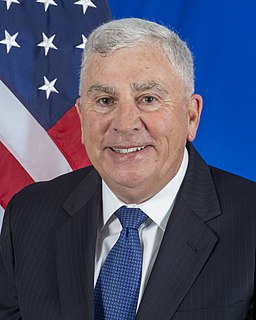A Quote by Zalmay Khalilzad
The terrorists want civil war. Al-Qaida is attacking Shiites. The Shiite militias are taking revenge on the Sunnis. And the Sunnis are become more extremist, with some joining al-Qaida.
Related Quotes
I don't think he fully analyzes the situation. If you destabilize [Bashar] Assad and punish Assad, you do embolden terrorists. You embolden al-Qaida because al-Qaida is on the other side of this war. So, one side wins if you destabilize the other side. So, he will be emboldening al-Qaida and the Islamic rebels. And I'm not so sure they're better than Assad.
Saddam Hussein had a lengthy history of reckless and sudden aggression. He cultivated ties to terror -- hosting the Abu Nidal organization, supporting terrorists, and making payments to the families of suicide bombers. He also had an established relationship with Al Qaida -- providing training to Al Qaida members in areas of poisons, gases and conventional bombs. He built, possessed, and used weapons of mass destruction.
We know definitively that Al-Qaida isn't all over Afghanistan anymore. According to CIA estimates, there are less than a hundred Al-Qaida members in the entire country. Most of them are in Pakistan. So, it's hard for me to understand why we're still fighting there and sending in more and more troops. I would get out of Afghanistan as quickly as possible.
The ironic factor that is between the Houthis and al-Qaida, that is, they both have strong anti-American sentiment. For example, the slogan of the Houthis is death to America and death to Israel and God curse the Jews and victory to Islam. And besides that, there is very little in common between al-Qaida and the Houthis as far as ideology goes, but they see themselves as having a common enemy, which is America. And America is in a situation, where the Houthis are fighting al-Qaida quite viciously on the ground, yet now the Americans are allied with Saudi Arabia in strikes against the Houthis.
But the U.S. has to be careful. If our strategy depends on Sunnis doing the fighting to clear Mosul and Ramadi - and, as near as I can tell, that is the strategy - then you have to be careful that Sunnis don't perceive the U.S. to be operating arm in arm with Iran or with Iranian-backed Shiite militias that Abadi - Prime Minister Abadi is using in Iraq, so that, in effect, we're fronting for Iran.
The center of gravity for opposition shifts to Idlib province and Idlib city. That city is dominated by the al-Qaida wing of the opposition and other Salafist forces. The United States and the West cannot support those Salafists and al-Qaida. It means that the rebels are going to have a very hard time getting significant amounts of support.



































